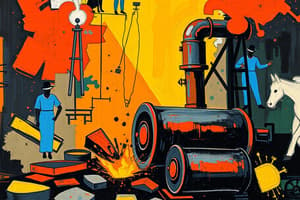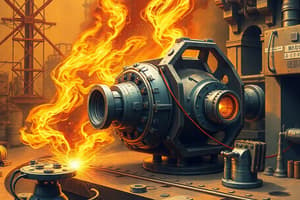Podcast
Questions and Answers
What is the purpose of roasting in the extraction of metals from sulphide ores?
What is the purpose of roasting in the extraction of metals from sulphide ores?
- To convert sulphides into oxides (correct)
- To convert oxides into sulphides
- To convert carbonates into oxides
- To convert oxides into sulphates
In the process of calcination, what type of ores are changed into oxides by heating strongly in limited air?
In the process of calcination, what type of ores are changed into oxides by heating strongly in limited air?
- Carbonate ores (correct)
- Sulphate ores
- Oxide ores
- Sulphide ores
Which method is commonly used for refining impure metals?
Which method is commonly used for refining impure metals?
- Distillation
- Filtration
- Electrolytic refining (correct)
- Crystallization
In which state do good conductors of electricity conduct but not in the solid state?
In which state do good conductors of electricity conduct but not in the solid state?
How can the rusting of iron be prevented according to the text?
How can the rusting of iron be prevented according to the text?
What is the term used for minerals that contain a very high percentage of a particular metal and can be profitably extracted from it?
What is the term used for minerals that contain a very high percentage of a particular metal and can be profitably extracted from it?
Which method is commonly used for the extraction of metals with medium reactivity such as Al, Zn, and Fe from their ores?
Which method is commonly used for the extraction of metals with medium reactivity such as Al, Zn, and Fe from their ores?
Which type of metal oxides react with both acids and bases to produce salts and water?
Which type of metal oxides react with both acids and bases to produce salts and water?
What happens when metals like Sodium and Potassium react with water?
What happens when metals like Sodium and Potassium react with water?
What is the term used for impurities such as soil and sand present in ores?
What is the term used for impurities such as soil and sand present in ores?
What happens when Aluminium and Iron react with water?
What happens when Aluminium and Iron react with water?
What occurs when a more reactive metal reacts with a solution of a less reactive metal salt?
What occurs when a more reactive metal reacts with a solution of a less reactive metal salt?
Flashcards
Roasting (in metallurgy)
Roasting (in metallurgy)
The process of heating sulphide ores in limited air to convert them into oxides.
Calcination
Calcination
Carbonate ores are heated strongly in limited air to form oxides.
Electrolytic refining
Electrolytic refining
A method used to purify impure metals by passing an electric current through a solution containing the impure metal.
Conductivity of metals
Conductivity of metals
Signup and view all the flashcards
Galvanizing
Galvanizing
Signup and view all the flashcards
Ores
Ores
Signup and view all the flashcards
Extraction of metals with medium reactivity
Extraction of metals with medium reactivity
Signup and view all the flashcards
Amphoteric oxides
Amphoteric oxides
Signup and view all the flashcards
Reaction of alkali metals with water
Reaction of alkali metals with water
Signup and view all the flashcards
Gangue
Gangue
Signup and view all the flashcards
Reaction of aluminum and iron with water
Reaction of aluminum and iron with water
Signup and view all the flashcards
Reactivity series of metals
Reactivity series of metals
Signup and view all the flashcards




